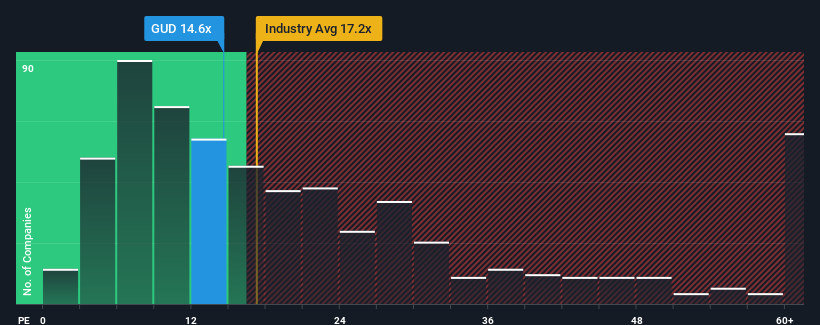- Australia
- /
- Auto Components
- /
- ASX:AOV
Investors Don't See Light At End Of GUD Holdings Limited's (ASX:GUD) Tunnel

When close to half the companies in Australia have price-to-earnings ratios (or "P/E's") above 20x, you may consider GUD Holdings Limited (ASX:GUD) as an attractive investment with its 14.6x P/E ratio. Nonetheless, we'd need to dig a little deeper to determine if there is a rational basis for the reduced P/E.
With its earnings growth in positive territory compared to the declining earnings of most other companies, GUD Holdings has been doing quite well of late. It might be that many expect the strong earnings performance to degrade substantially, possibly more than the market, which has repressed the P/E. If not, then existing shareholders have reason to be quite optimistic about the future direction of the share price.
View our latest analysis for GUD Holdings

How Is GUD Holdings' Growth Trending?
The only time you'd be truly comfortable seeing a P/E as low as GUD Holdings' is when the company's growth is on track to lag the market.
Taking a look back first, we see that the company grew earnings per share by an impressive 105% last year. The latest three year period has also seen an excellent 39% overall rise in EPS, aided by its short-term performance. Accordingly, shareholders would have probably welcomed those medium-term rates of earnings growth.
Shifting to the future, estimates from the ten analysts covering the company suggest earnings should grow by 6.2% per year over the next three years. With the market predicted to deliver 16% growth each year, the company is positioned for a weaker earnings result.
With this information, we can see why GUD Holdings is trading at a P/E lower than the market. Apparently many shareholders weren't comfortable holding on while the company is potentially eyeing a less prosperous future.
What We Can Learn From GUD Holdings' P/E?
Generally, our preference is to limit the use of the price-to-earnings ratio to establishing what the market thinks about the overall health of a company.
We've established that GUD Holdings maintains its low P/E on the weakness of its forecast growth being lower than the wider market, as expected. Right now shareholders are accepting the low P/E as they concede future earnings probably won't provide any pleasant surprises. It's hard to see the share price rising strongly in the near future under these circumstances.
Having said that, be aware GUD Holdings is showing 1 warning sign in our investment analysis, you should know about.
It's important to make sure you look for a great company, not just the first idea you come across. So take a peek at this free list of interesting companies with strong recent earnings growth (and a low P/E).
New: Manage All Your Stock Portfolios in One Place
We've created the ultimate portfolio companion for stock investors, and it's free.
• Connect an unlimited number of Portfolios and see your total in one currency
• Be alerted to new Warning Signs or Risks via email or mobile
• Track the Fair Value of your stocks
Have feedback on this article? Concerned about the content? Get in touch with us directly. Alternatively, email editorial-team (at) simplywallst.com.
This article by Simply Wall St is general in nature. We provide commentary based on historical data and analyst forecasts only using an unbiased methodology and our articles are not intended to be financial advice. It does not constitute a recommendation to buy or sell any stock, and does not take account of your objectives, or your financial situation. We aim to bring you long-term focused analysis driven by fundamental data. Note that our analysis may not factor in the latest price-sensitive company announcements or qualitative material. Simply Wall St has no position in any stocks mentioned.
About ASX:AOV
Amotiv
Through its subsidiaries, manufactures, imports, distributes, and sells automotive products in Australia, New Zealand, Thailand, South Korea, France, and the United States.
Very undervalued with excellent balance sheet and pays a dividend.


